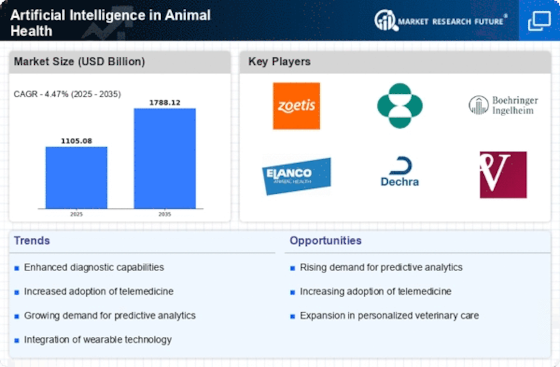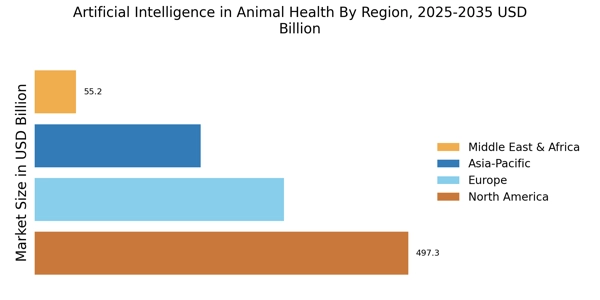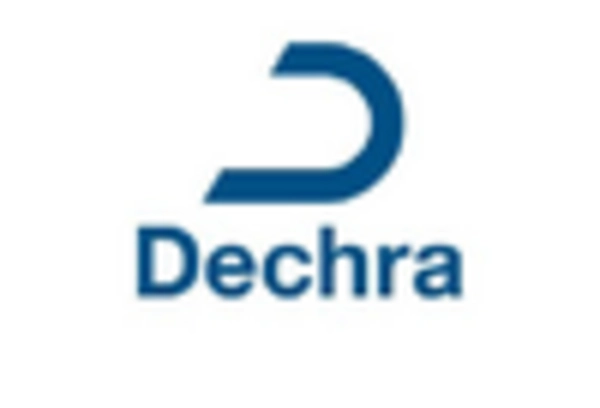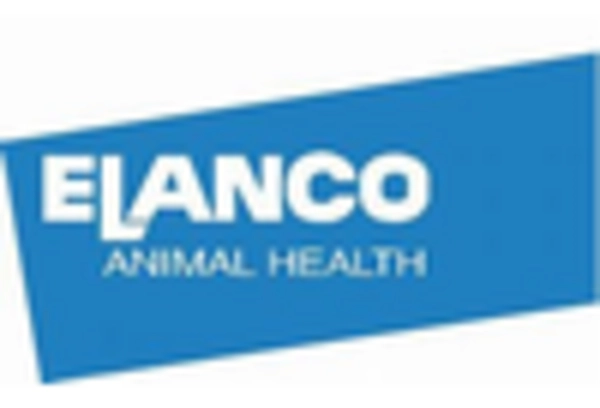Advancements in AI Technology
Technological advancements in artificial intelligence are significantly influencing the Artificial Intelligence In Animal Health Market. Innovations in machine learning, natural language processing, and computer vision are enabling more sophisticated applications in veterinary diagnostics and treatment. For instance, AI algorithms can analyze vast datasets to identify patterns that may not be apparent to human practitioners. This capability enhances diagnostic accuracy and treatment efficacy, which is crucial in managing animal health. The integration of AI technologies is expected to lead to a market growth rate of around 25% in the coming years, as more veterinary practices adopt these advanced solutions to improve patient outcomes.
Growing Awareness of Animal Welfare
The heightened awareness surrounding animal welfare is propelling the Artificial Intelligence In Animal Health Market. As consumers become more conscious of the ethical treatment of animals, there is a corresponding demand for technologies that ensure better health outcomes. AI applications, such as predictive analytics and real-time monitoring systems, are being adopted to enhance animal welfare standards. This shift is not only beneficial for the animals but also aligns with consumer expectations, thereby influencing purchasing decisions. The market is expected to see a significant uptick as businesses strive to meet these evolving standards, potentially increasing market size by 15% over the next few years.
Regulatory Support for AI Integration
Regulatory frameworks that support the integration of AI technologies in veterinary practices are emerging as a crucial driver in the Artificial Intelligence In Animal Health Market. Governments are beginning to establish guidelines that facilitate the safe and effective use of AI in animal health. This regulatory support is essential for fostering innovation and ensuring that AI applications meet safety and efficacy standards. As these frameworks become more established, they are likely to encourage more veterinary practices to adopt AI solutions, thereby expanding the market. The anticipated regulatory clarity could lead to a market growth of approximately 18% as stakeholders seek to comply with new standards while enhancing their service offerings.
Rising Demand for Animal Health Solutions
The increasing demand for effective animal health solutions is a primary driver in the Artificial Intelligence In Animal Health Market. As pet ownership rises and livestock farming expands, the need for advanced health management systems becomes more pronounced. The market is projected to grow at a compound annual growth rate of approximately 20% over the next few years, indicating a robust appetite for innovative technologies. This demand is fueled by the necessity for improved disease prevention and management strategies, which AI can facilitate through data-driven insights. Consequently, stakeholders are investing heavily in AI technologies to enhance the quality of care provided to animals, thereby driving the market forward.
Increased Investment in Veterinary Research
The surge in investment directed towards veterinary research is a notable driver of the Artificial Intelligence In Animal Health Market. Governments and private entities are recognizing the importance of animal health in public health and food security. This recognition has led to increased funding for research initiatives that leverage AI to develop new diagnostic tools and treatment protocols. For example, research institutions are utilizing AI to analyze genetic data, which can lead to breakthroughs in disease prevention. This trend is likely to bolster the market, as enhanced research capabilities translate into more effective health solutions for animals, thereby attracting further investment.


















